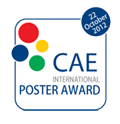
| |
EnginSoft - Conference Abstracts
EnginSoft International Conference 2009 |
Modelling of condensate formation and disposal inside an automotive headlamp |
Deponti Alberto - EnginSoft |
Abstract |
An automotive headlamp is an environment with high thermal and low mass exchanges with the external environment: air tends to re-circulate inside the headlamp due to the heating from the switched on lamps. A small amount of air can pass through small openings usually situated in the rear part of the headlamp itself. Since the headlamp is in communication with the external environment but the passage of air is very low, humidity can accumulate inside the headlamp and can condensate on the lens. An headlamp design can be produced only if, under severe thermal conditions, all the formed condensate is disposed in a fixed time. Each producer fixes a particular standard to be fulfilled. Since experimental studies are very expensive, numerical modelling is an important tool to optimise headlamp design and to reduce costs. In order to capture the relevant physics of the problem, long transient simulations are to be performed on large meshes. A new numerical model has been implemented in order to study this problem. Numerical and experimental results. In this model the liquid phase is not explicitly modelled but the effects of condensation and evaporation are accounted for by means of source terms in the conservation equations of mass and energy. Humid air is considered inside the headlamp and buoyancy effects are accounted for. Thermal inertia and radiation of all solid elements are also considered. The model has been applied to real case headlamp designs providing good agreement between numerical and experimental results. |
Back to index |



